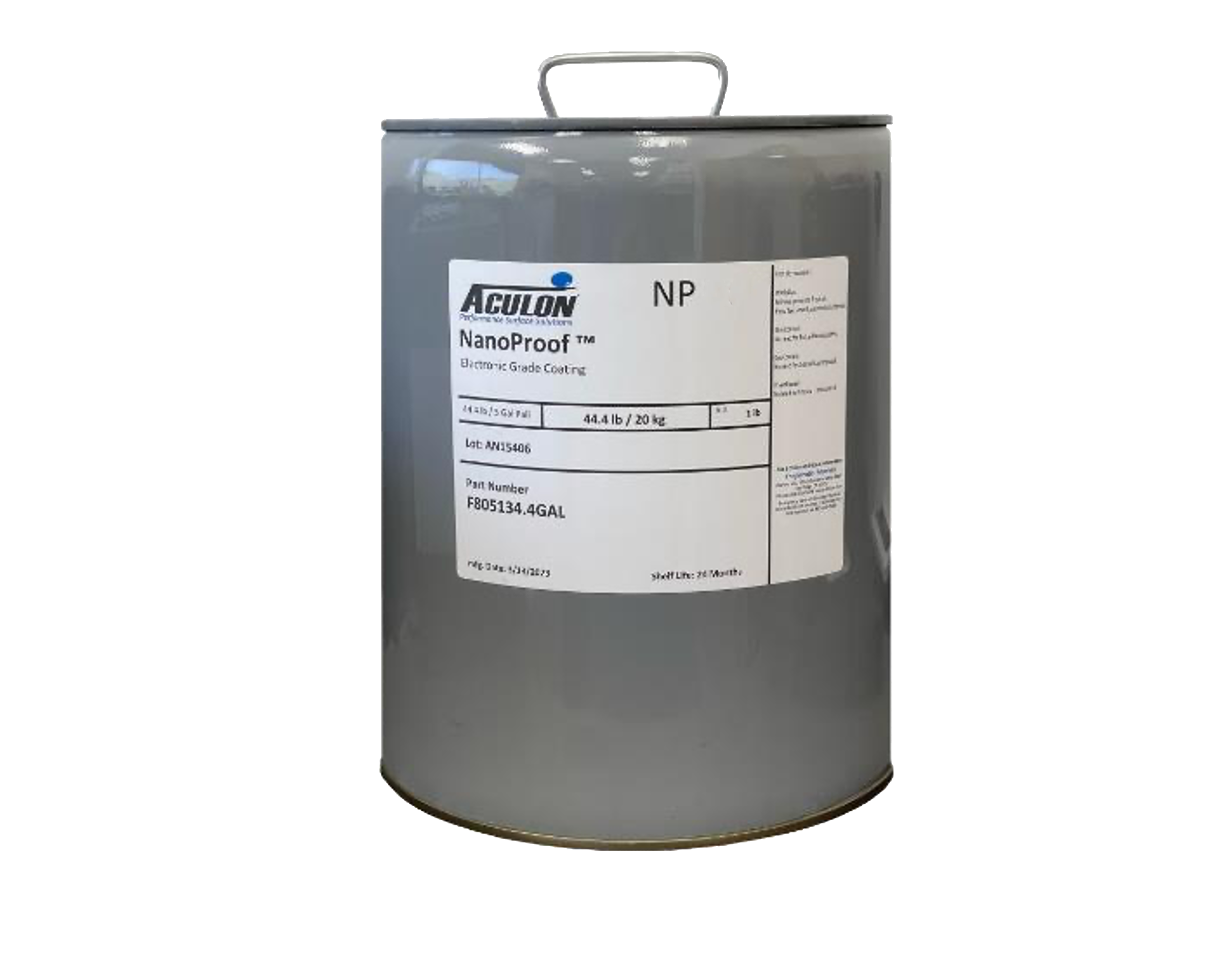Aculon Nanoproof 3-01
- 1% Fluoroacrylate Solids
- 1 um Thickness
- 3M Novec replacement
Product Description
Aculon Nanoproof 3-01 is a highly effective electronic coating series designed to provide superior protection against moisture, chemicals, and corrosion for a wide range of electronic applications. With the discontinuation of the popular 3M Novec product line, the Aculon Nanoproof 3.0 series offers a readily available and accessible alternative for industries that require robust protection for their electronic devices.
Aculon Nanoproof 3-01 with 1% Fluoroacrylate solids, forms a thin, transparent layer that provides excellent anti-wetting and anti-stiction properties, protecting electronic devices from harmful elements. With this amount of solids, it manages to reach a coating thickness of less than 1um. The coating also offers electrical insulation properties, reducing the risk of electrical shorts and failures of PCBs and Electrical components.
The Aculon Nanoproof 3.0 series comes in different grades, with Aculon Nanoproof 3-01 allowing such a thin coating that doesn't even have a direct alternative on 3M Novec products It is ideal for use in harsh environments, making it a popular choice in industries such as automotive, aerospace, and defense. Aculon Nanoproof 3-01 is easy to apply, and its transparent coating ensures that it does not interfere with the aesthetics or functionality of electronic devices. It is suitable for use on a variety of electronic applications, including printed circuit boards, sensors, switches, and connectors.
Applications:
- Moisture, chemical, and corrosion protection for printed circuit boards and electrical components
- Anti-wetting and anti-stiction in many diverse applications
Technical Specifications
| General Properties | |
| Refractive index Refractive index The refractive index determines how much the path of light is bent, or refracted, when entering a material. It is calculated by taking into account the velocity of light in vacuum compared to the velocity of light in the material. The refractive index calculation can be affected by the wavelength of light and the temperature of the material. Even though it is usually reported on standard wavelengths it is advised to check the TDS for the precise test parameters. | 1.376 |
| Solids | 1 % |
| Physical Properties | |
| Viscosity Viscosity Viscosity is a measurement of a fluid’s resistance to flow. Viscosity is commonly measured in centiPoise (cP). One cP is defined as the viscosity of water and all other viscosities are derived from this base. MPa is another common unit with a 1:1 conversion to cP. A product like honey would have a much higher viscosity -around 10,000 cPs- compared to water. As a result, honey would flow much slower out of a tipped glass than water would. The viscosity of a material can be decreased with an increase in temperature in order to better suit an application | 20 mPa.s |
| Thermal Properties | |
| Glass Transition Temperature (Tg) Glass Transition Temperature (Tg) The glass transition temperature for organic adhesives is a temperature region where the polymers change from glassy and brittle to soft and rubbery. Increasing the temperature further continues the softening process as the viscosity drops too. Temperatures between the glass transition temperature and below the decomposition point of the adhesive are the best region for bonding. The glass-transition temperature Tg of a material characterizes the range of temperatures over which this glass transition occurs. | 95 °C |
| Other Properties | |
| Oil Contact Angle Oil Contact Angle The contact angle is the angle, conventionally measure trough the liquid, where a liquid-vapor interface meets a solid surface. | 80 ° |
| Water Contact Angle | 120 ° |
Additional Information
Thickness depends on the amount of Solids. The higher the amount of solids, the thicker the coating after the solvent evaporates.
Compatible with:
PEEK, Polyethylene terephthalate (PET), Polyphenylene sulfide (PPS), Polystyrene, EPDM, ABS, Aluminum, Stainless Steel, Glass
Avoid:
Viton, HDPE, LDPE, CPVC, PVC, PTFE, PVDF, silicone, neoprene, Polypropylene, PMMA







